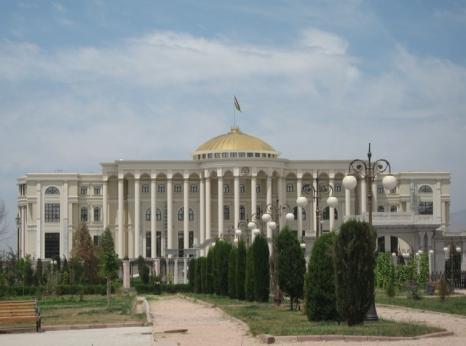Tajikistan: Tajik Dissenter Deported And Convicted

Before his conviction, Abdullohi Shamsiddin was refused international protection by Germany and deported from Dusseldorf on 18 January 2023 via Turkey. Relatives waiting for him in the Tajikistani capital Dushanbe on 19 January 2023 did not see him leave the airport. According to confidential sources close to Abdullohi Shamsiddin, he was detained by the State Committee for National Security near the airstrip immediately after landing, subject to enforced disappearance and then held in solitary confinement in a remand prison in Dushanbe.
Abdullohi Shamsiddin claims to have been an Islamic Revival Party of Tajikistan (IRPT) activist and closely acquainted with Muhiddin Kabiri, the party’s leader. Abdullohi Shamsiddin is also the son of Shamsiddin Saidov, a leading member of the IRPT, who was recognized as a refugee in Germany in 2017. The IRPT was Tajikistan’s most important opposition party, represented in the parliament for many years, until its arbitrary ban and designation as a “terrorist” organization in 2015. Following this, the authorities arrested and imprisoned its leaders following unfair trials. Individuals associated with the party and its leadership have been targeted by Tajikistani authorities in Tajikistan and abroad. The authorities have sought to have them extradited, then arrested them and prosecuted them after unfair trials. Even lawyers who provided legal defence to party members have themselves been subjected to brutal reprisals including long-term imprisonment under trumped-up charges.
The first attempt to deport Abdullohi Shamsiddin via Munich Airport failed on 12 December 2022, because he panicked and purposely injured himself to avoid deportation. After this incident, he was held in custody to secure his deportation. In a newspaper article of 29 December 2022, he was quoted saying: “In Tajikistan I will be arrested directly from the aeroplane – and disappear in prison for 20 years.” International organizations, including the Norwegian Helsinki Committee, Human Rights Watch and the German Abschiebungsreporting NRW, warned that Abdullohi Shamsiddin was under risk of detention and torture if deported to Tajikistan. However, the Federal Office for Migration and Refugees (BAMF) rejected his second follow-up asylum application in fast-track proceedings on 21 December 2022. On 6 January 2023, the Gelsenkirchen Administrative Court ruled against the suspension of deportation stating: “It is not significantly likely that he would be exposed to an exceptional situation within the meaning of Art. 3 European Convention on Human Rights [torture or inhuman or degrading treatment or punishment] in the event of a return to his country of origin due to his particular individual situation.” On 19 January 2023, the same Court refused to stop the ongoing deportation (in transit) and did not accept the authenticity of newly presented evidence, namely a private paternity test which proved the relation between Shamsiddin Saidov and Abdullohi Shamsiddin, and a testimony by a Tajik refugee who testified that he had identified and disclosed the whereabouts of Abdullohi Shamsiddin when he himself been tortured in Tajikistan in 2019. Fearing reprisals by the Tajikistani authorities who have been targeting associates of the IRPT abroad, Abdullohi Shamsiddin reportedly initially concealed his identity and relationship with his father, when he first applied for refugee status in Germany in 2009. This application was rejected in 2011. A follow-up application was submitted in 2017 and rejected in court in 2021. He has two small children and was working in the city of Dortmund. According to the family, he suffers from severe asthma.
According to Human Rights Watch, a court in Dushanbe convicted Abdullohi Shamsiddin on charges under article 307 of the Criminal Code (“public calls for the violent change of the constitutional order of the Republic of Tajikistan”) and sentenced him to seven years in prison on 29 March 2023. Due process was not followed, and the authorities have neither confirmed the whereabouts of Abdullohi Shamsiddin nor the court verdict. Media reported that Abdullohi Shamsiddin’s participation in a protest event and likes under social media posts had played major roles in the court process. Tajikistan’s security agencies reportedly intimidated people protesting Abdullohi Shamsiddin’s deportation in Germany by putting pressure on protestors’ relatives in Tajikistan.
Tajikistan’s security agencies routinely target dissidents and opposition figures, as well as their relatives and intimates. Torture and other ill-treatment of detainees during interrogation by various security agencies, particularly the State Committee for National Security or the so-called Sixth Department of the Ministry of the Interior, is common in Tajikistan to extract “confessions,” secure information and incriminate others. Torture methods used by Tajik security agencies allegedly include sticking needles under fingernails, electric shocks, beating, sexual violence, sleep deprivation, suffocation with plastic bags and injection of drugs.